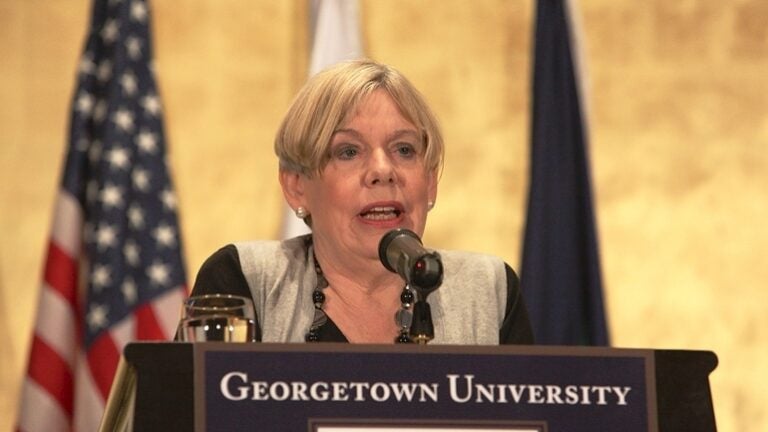Dialogue Series, Race & Society, Regional Studies
Karen Armstrong on the Core of Our Religious Traditions

In a joint CIRS and Georgetown faculty Distinguished Lecture, Karen Armstrong was invited to share her thoughts on “The Core of our Religious Traditions” on March 13, 2011. Armstrong is a former Roman Catholic nun who left a British convent to pursue a degree in modern literature at Oxford, a best-selling author, and UN Ambassador for the Alliance of Civilizations.
Armstrong began by defining the contradictory role of religion in today’s globalized world by saying that although it contributes towards the building of a global community and teaches tolerance among disparate people, it is also regarded as the main cause of global violence and conflict. “I’m convinced,” she said, “that religion has a major contribution to make to one of the chief tasks of our time, which must surely be to build a global community where people of all persuasions can live together in harmony and respect.” However, Armstrong noted, it is important to point out that “In fact, the cause of war is usually ambition, hatred, and greed, but, often, these self-serving emotions are given an idealistic or a religious coloration in order to sanitize them.” Although she acknowledged the history of international conflict based upon religion, she argued that their specific motivations usually stem from the more individualistic concerns of a selfish few.
Speaking of the Axial Age between 900-200 BCE, Armstrong noted that this was a moment of history which was the center of humankind’s spiritual experience when all the major world religions had their origins. In China, during this time, Confucianism and Daoism were born; in India, Hinduism and Buddhism blossomed; in the Middle East sprung up the roots of monotheism, which would guide the teachings of Judaism, Christianity, and Islam; and in Greece, philosophical rationalism gave rise to Western philosophy, which became a religious movement in its own way. Armstrong explained that although these ancient traditions are distinct from each other, they share certain values that have shaped our current understandings of existence and have much to say to us in our modern world. Although these traditions have helped explain existentialism, Armstrong warned of the impossibility of fully knowing the unknown and said that “One of the things that has gone wrong in the modern age, and it is certainly true that religious people can be opinionated, exclusive, and intolerant, is that they insisted that when we speak of the ultimate reality, which has been called God, Nirvana, Brahman, and Dao, we think we know what we are talking about” and can define it implicitly. However, she argued, as in the Muslim belief that “God is greater,” the divine is always beyond the limit of what our language and thoughts permit.
As part of her scholarly inquiries into the history of religion, Armstrong said that within the English language, the word “belief” has changed its meaning over the centuries. Up until the seventeenth century, the word was pronounced differently in Middle English and came from the German “to love” and “to commit oneself” as well as the Latin root of “desire,” or “libido.” The word “belief” did not have the same connotations of “blind faith” and acceptance of doctrine that it does today. Armstrong said that, ultimately, “religion, of course, is not about thinking things or believing things, but about doing things. What is the Qur’an but a call to action? When the Qur’an talks of faith it doesn’t mean that we have to accept a whole lot of ideas, but it follows it up always with its performing the works of mercy, or the salihat,” wherein the Qur’an asks people to do good and look after the poor and the vulnerable, to free slaves, and care for orphans and widows.
Concluding the lecture Armstrong explained that every world religion has at its core the ethical principle of compassion. She said “It now seems to me quite clear that unless as a species we learn to treat all peoples as we would wish to be treated ourselves whoever they are and whatever their beliefs, we are not going to have a viable world to hand on to the next generation and that any ideology that breeds or encourages hatred and contempt is failing the test of our time and failing humanity.”
Armstrong’s books have been translated into forty-five languages. In addition to teaching, she regularly comments on religious affairs in England and the United States and is a columnist for the Guardian newspaper. In 2007 she was awarded a medal for Arts and Sciences by the Egyptian government for her services to Islam, the first foreigner to have been awarded this decoration. She is a recipient of the TED prize.
Article by Suzi Mirgani, Publications Coordinator